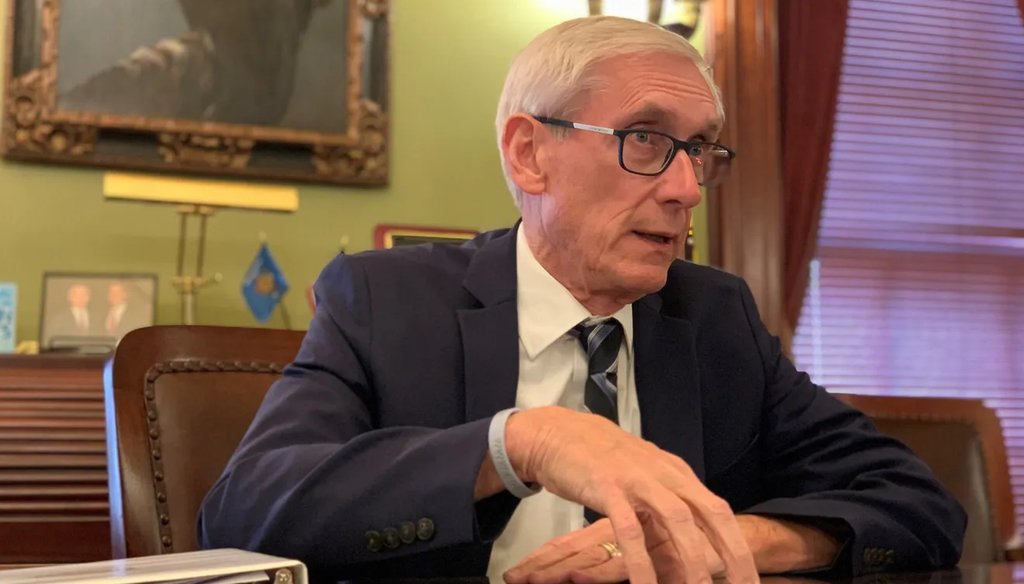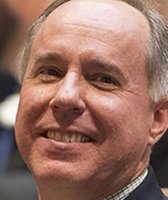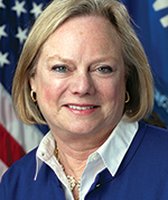Stand up for the facts!
Our only agenda is to publish the truth so you can be an informed participant in democracy.
We need your help.
I would like to contribute

Gov. Tony Evers has granted more pardons than any Wisconsin governor in contemporary history. (Molly Beck / Milwaukee Journal Sentinel.)
With Wisconsin’s gubernatorial race set to take place Nov. 8, 2022, it’s time to take a look back on how Gov. Tony Evers has fared on some of his first-term campaign promises.
Evers has no Democratic challenger. Republican hopefuls in the Aug. 9, 2022, primary include Rebecca Kleefisch, Kevin Nicholson, Timothy Ramthun and Tim Michels, who has been endorsed by former President Donald Trump.
We use the Evers-O-Meter to track progress on promises Evers made as a candidate in 2018. Like the Walk-O-Meter before it, which tracked Republican Scott Walker’s promises, we assign ratings based on outcomes, not intent or effort on the part of Evers — a Democrat who has faced a Republican-held Legislature.
In other words, we’re taking a bottomline look at whether promises were accomplished in the timeframe set – typically that’s the first term, but in some cases Evers noted at the time fulfilling the promises would take longer.We assign ratings based on the status of the promise: In the Works, Stalled, Compromise, Promise Kept or Promise Broken. Here is a look at six promises we recently rated.
1. Raise minimum wage to $15 an hour, with automatic inflationary increases.
Wisconsin's minimum wage has been $7.25 an hour since 2009. As a candidate in 2018, Evers pledged to raise the minimum wage to $15 an hour, with automatic inflationary increases. His first budget took steps to do that — albeit relatively small ones — by proposing an increase to $8.25 in 2020, then 75 cents per year for three years after that and then growing at the rate of inflation. That failed in the GOP-controlled Legislature.
In his 2021-’23 budget, Evers wanted to immediately raise the minimum wage to $8.60. The proposal called for it to go up to $10.15 by 2024 and increase by the rate of inflation annually after that. Again, the matter failed in the Legislature.
This promise was previously rated In the Works. But with the end of Evers’ term approaching, we need to offer a final rating. Our policy with the Evers-O-Meter, like the Walk-O-Meter before it, is to rate outcomes, not intent. Despite Evers’ efforts, this promise is not in place. If he wins a second term, we’ll revisit next year. But for now, we rate it Promise Broken.
2. Assure high-speed broadband access to all homes, businesses.
In 2021, a task force on broadband appointed by Evers released a report outlining strategies for making high-speed internet available to every home, business and institution in the state by 2025.
The report called for more funding for the state broadband expansion grant program, establishing a program to help low-income families afford service, increased consumer protections and improved pricing transparency.
From 2019, the year Evers took office, to early 2022, Wisconsin had allocated nearly $60 million for broadband, also known as high-speed internet, aimed at tens of thousands of households and businesses. On June 24, 2022, the Wisconsin Public Service Commission awarded an additional $125 million in broadband expansion grants for 71 projects aimed at reaching around 83,000 homes and 4,600 businesses.
The PSC says about 650,000 people in the state lack home internet access of 25 megabits-per-second downloads and 3 Mbps uploads, which is adequate for streaming a video or taking an online class. And, officials say, another 650,000 people just can't afford the service that's available to them.
So, progress is being made on getting high-speed broadband access to homes, but there are still hundreds of thousands of homes and businesses without access.
This promise was previously rated In the Works.
In some cases, such as raising the minimum wage, there has been no progress under Evers. In this case, there has been progress – just not enough to meet the original goal.
With the end of the term approaching, we rate this one Compromise.
3. Support ending solitary confinement.
While campaigning in 2018, Evers said he supported banning the practice of keeping inmates in solitary confinement as a way to manage behavior. Media reports at the time noted that a group of Wisconsin inmates planned to stop eating to persuade Evers to scale back the use of solitary confinement in state prisons.
In April 2019, PolitiFact Wisconsin noted that Evers could make such a move to ban solitary confinement unilaterally through an executive order, but he had not yet taken any action and we rated the promise Stalled.
In Evers’ 2021-23 budget, no reference was made to ending solitary confinement under the Justice and Reform heading. In addition, we found no mention of ending solitary confinement in the listing of the governor’s Executive Orders for the years 2019, 2020, 2021 and 2022.
According to WI Admin Code § DOC 308.04, as of March 28, 2022, an inmate may be placed in "Administrative (solitary) confinement, which is an involuntary status for the segregated confinement of an inmate whose continued presence in general population poses a serious threat to life, property, self, staff, or other inmates, or to the security or orderly running of the institution."
We asked Evers’ staff for any evidence on progress related to this promise, as well as others, but have not received an update.
Since no movement has apparently been made, we are rating this Promise Broken.
4. Work to cut prison population in half in coming years.
During his 2018 campaign, now-Gov. Tony Evers said he supported the "goal" of cutting the Wisconsin prison population in half.
Evers noted it was a long-term effort that couldn't be done in a single term. So we’re evaluating this one based on how much progress has been made in that direction, and if it’s based on actions by Evers.
In a January 2021 email to PolitiFact Wisconsin, Evers spokesperson Britt Cudaback noted that the prison population had dropped from more than 23,000 in 2019, when Evers took office, to 20,000 at the end of 2020.
The state Department of Corrections at the time said that drop was primarily due to the effects of the coronavirus pandemic, which halted trials for a time.
"A major part of the decrease in population can be attributed to a slower-moving court system during the pandemic," DOC spokesman John Beard said in an email at the time.
Beard also noted the department itself — and therefore the administration — is limited in its ability to immediately reduce the population, since only a few programs allow inmates to be set free before their scheduled release date. According to a DOC "Persons in Our Care" report, as of April 1, 2022, the state adult prison population was at 19,878, down scarcely a notch from the 20,000 reported at the end of 2020.
In 2021, we rated his promise In the Works.
But there has been virtually no movement since then. From the start, Evers noted this was a long-term goal — not one to be completed in a single term.
We are moving this rating to Stalled.
5. Prohibit businesses from asking applicants about criminal histories.
Evers included a so-called "ban the box" provision in his 2019-20 budget, but it was stripped out by Republicans in the Legislature, so at that time we rated the measure Stalled. Evers proposed the change again in his 2021-23 budget.
"Currently, 13 states and the District of Columbia prohibit private employers from asking applicants to identify whether they have criminal records, including Illinois and Minnesota," Cudaback, Evers' spokesperson, told us in March 2021. "The governor's budget would prevent a prospective employer from requesting conviction information from a job applicant before the applicant receives a job interview. This would apply, too, for crimes that have been expunged."
In 2016, then-Gov. Scott Walker, a Republican, signed the 2015 Wisconsin Act 150, which incorporated a "ban the box" provision as part of a Civil Service reform measure.
But that applied to state hires through the civil service process.
Ever's proposal would apply to all employers in the state.
And while he made an effort on it, the bottom line is this goal has not been met in his first term – and with the Legislature out of session for the year, there’s no path to getting it passed this year.
We rate this Promise Broken.
6. Expand background checks and put in place gun restrictions
In his first budget, Gov. Tony Evers tried to expand background checks and put in place gun restrictions but the Republican-led Legislature blocked the change.
The governor's 2021-23 budget proposal put the matter back on the table, calling for a universal background check requirement for all firearm sales.
The measure would have prohibited any person from transferring any firearm, including the frame or receiver of a firearm, unless the transfer occured through a federally licensed firearms dealer and involved a Wisconsin Department of Justice background check.
It also proposed what is known as a "red flag" law, which would allow a judge to bar people deemed a threat to themselves or others from having a gun for a set period. A family member or law enforcement officer would be able to seek such an order.
Only 19 states have red flag laws, but a key piece of the recent federal legislation provided money to states to establish such programs. That said, a May 22, 2022, Milwaukee Journal Sentinel article noted "Republicans who control the state Legislature are unlikely to ever take up legislation to expand background checks or add red-flag policies and have rejected repeated calls from Democrats to do so."
We rated this promise In the Works in March 2021, since the proposal was back on the table in the 2021-23 budget. However, Republicans removed those provisions.
We asked Evers’ staff for any evidence on progress related to this promise, and other promises, but did not receive any updates.
Despite Evers’ efforts, this promise is not in place. If the governor wins a second term, we’ll revisit next year. But for now, we rate it Promise Broken.
Our Sources
PolitiFact Wisconsin Evers-O-Meter
PolitiFact Wisconsin Evers-O-Meter, March 26, 2019.
Governor’s Task Force on Broadband Access, 2021
Milwaukee Journal Sentinel "Wisconsin awards $125M in rural internet service grants. Which communities will receive higher speeds?" June 24, 2022
Milwaukee Journal Sentinel "Inmates say they will stop eating to persuade Tony Evers 'to make good' on campaign pledge to reduce solitary confinement," March 27, 2019.
PolitiFact Wisconsin Evers-O-Meter, April 18, 2019.
PolitiFact Wisconsin Evers-O-Meter, March 9, 2021.
Budget in Brief, Feb. 2021
PolitiFact Wisconsin Evers-O-Meter, Jan. 19, 2021
Budget in Brief, 2021-23
Gov. Tony Evers, Executive Orders
Milwaukee Journal Sentinel "As Congress passes new gun controls, what to know about Wisconsin's laws on concealed carry, age limits and more," June 30, 2022
Wispolitics.com "Republican Party of Wisconsin Resolutions 2022"
PolitiFact Wisconsin Evers-O-Meter, March 9, 2021.
Justia Regulations "Wisconsin Administrative Code Department of Corrections Chapter DOC 308 - Administrative Confinement Section DOC 308.04 - Administrative confinement," March 28, 2022
Milwaukee Journal Sentinel "Wisconsin Democrats call for stricter gun laws, GOP candidate Nicholson seeks more armed security after Texas school shootings," May 22, 2022
Milwaukee Journal Sentinel """"""" "Nearly everyone supports universal background checks for gun buyers. Here's why Wisconsin is unlikely to make it law," Aug. 7, 2019

















































